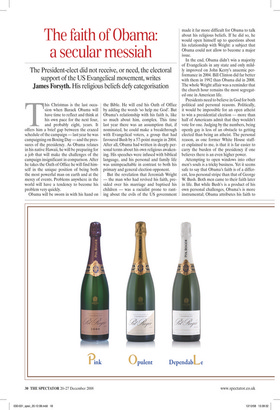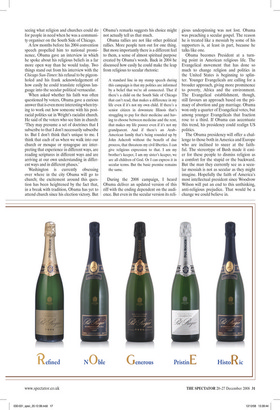The faith of Obama: a secular messiah
The President-elect did not receive, or need, the electoral support of the US Evangelical movement, writes James Forsyth. His religious beliefs defy categorisation
This Christmas is the last occasion when Barack Obama will have time to reflect and think at his own pace for the next four, and probably eight, years. It offers him a brief gap between the crazed schedule of the campaign — last year he was campaigning on Boxing Day — and the pressures of the presidency. As Obama relaxes in his native Hawaii, he will be preparing for a job that will make the challenges of the campaign insignificant in comparison. After he takes the Oath of Office he will find himself in the unique position of being both the most powerful man on earth and at the mercy of events. Problems anywhere in the world will have a tendency to become his problem very quickly.
Obama will be sworn in with his hand on the Bible. He will end his Oath of Office by adding the words ‘so help me God’. But Obama’s relationship with his faith is, like so much about him, complex. This time last year there was an assumption that, if nominated, he could make a breakthrough with Evangelical voters, a group that had favoured Bush by a 57-point margin in 2004. After all, Obama had written in deeply personal terms about his own religious awakening. His speeches were infused with biblical language, and his personal and family life was unimpeachable in contrast to both his primary and general election opponent.
But the revelation that Jeremiah Wright — the man who had revived his faith, presided over his marriage and baptised his children — was a racialist prone to ranting about the evils of the US government made it far more difficult for Obama to talk about his religious beliefs. If he did so, he would open himself up to questions about his relationship with Wright: a subject that Obama could not allow to become a major issue.
In the end, Obama didn’t win a majority of Evangelicals in any state and only mildly improved on John Kerry’s anaemic performance in 2004. Bill Clinton did far better with them in 1992 than Obama did in 2008. The whole Wright affair was a reminder that the church hour remains the most segregated one in American life.
Presidents need to believe in God for both political and personal reasons. Politically, it would be impossible for an open atheist to win a presidential election — more than half of Americans admit that they wouldn’t vote for one. Judging by the numbers, being openly gay is less of an obstacle to getting elected than being an atheist. The personal reason, as one former White House staffer explained to me, is that it is far easier to carry the burden of the presidency if one believes there is an even higher power.
Attempting to open windows into other men’s souls is a tricky business. Yet it seems safe to say that Obama’s faith is of a different, less personal stripe than that of George W. Bush. Both men came to their faith later in life. But while Bush’s is a product of his own personal challenges, Obama’s is more instrumental; Obama attributes his faith to seeing what religion and churches could do for people in need when he was a community organiser on the South Side of Chicago.
A few months before his 2004 convention speech propelled him to national prominence, Obama gave an interview in which he spoke about his religious beliefs in a far more open way than he would today. Two things stand out from his interview with the Chicago Sun-Times: his refusal to be pigeonholed and his frank acknowledgement of how easily he could translate religious language into the secular political vernacular.
When asked whether his faith was often questioned by voters, Obama gave a curious answer that is even more interesting when trying to work out how someone with his postracial politics sat in Wright’s racialist church. He said of the voters who see him in church: ‘They may presume a set of doctrines that I subscribe to that I don’t necessarily subscribe to. But I don’t think that’s unique to me. I think that each of us when we walk into our church or mosque or synagogue are interpreting that experience in different ways, are reading scriptures in different ways and are arriving at our own understanding in different ways and in different phases.’ Washington is currently obsessing over where in the city Obama will go to church; the excitement around this question has been heightened by the fact that, in a break with tradition, Obama has yet to attend church since his election victory. But Obama’s remarks suggests his choice might not actually tell us that much.
Obama rallies are not like other political rallies. More people turn out for one thing. But more importantly there is a different feel to them, a sense of almost spiritual purpose created by Obama’s words. Back in 2004 he discussed how easily he could make the leap from religious to secular rhetoric:
A standard line in my stump speech during this campaign is that my politics are informed by a belief that we’re all connected. That if there’s a child on the South Side of Chicago that can’t read, that makes a difference in my life even if it’s not my own child. If there’s a senior citizen in downstate Illinois that’s struggling to pay for their medicine and having to choose between medicine and the rent, that makes my life poorer even if it’s not my grandparent. And if there’s an Arab– American family that’s being rounded up by John Ashcroft without the benefit of due process, that threatens my civil liberties. I can give religious expression to that. I am my brother’s keeper, I am my sister’s keeper, we are all children of God. Or I can express it in secular terms. But the basic premise remains the same.
During the 2008 campaign, I heard Obama deliver an updated version of this riff with the ending dependent on the audience. But even in the secular version its reli gious underpinning was not lost. Obama was preaching a secular gospel. The reason he is treated like a messiah by some of his supporters is, at least in part, because he talks like one.
Obama becomes President at a turning point in American religious life. The Evangelical movement that has done so much to change religion and politics in the United States is beginning to splinter. Younger Evangelicals are calling for a broader approach, giving more prominence to poverty, Africa and the environment. The Evangelical establishment, though, still favours an approach based on the primacy of abortion and gay marriage. Obama won only a quarter of Evangelical votes, but among younger Evangelicals that fraction rose to a third. If Obama can accentuate this trend, his presidency could realign US politics.
The Obama presidency will offer a challenge to those both in America and Europe who are inclined to sneer at the faithful. The stereotype of Bush made it easier for these people to dismiss religion as a comfort for the stupid or the backward. But the man they currently see as a secular messiah is not as secular as they might imagine. Hopefully the faith of America’s most intellectual president since Woodrow Wilson will put an end to this unthinking, anti-religious prejudice. That would be a change we could believe in.























































































































 Previous page
Previous page